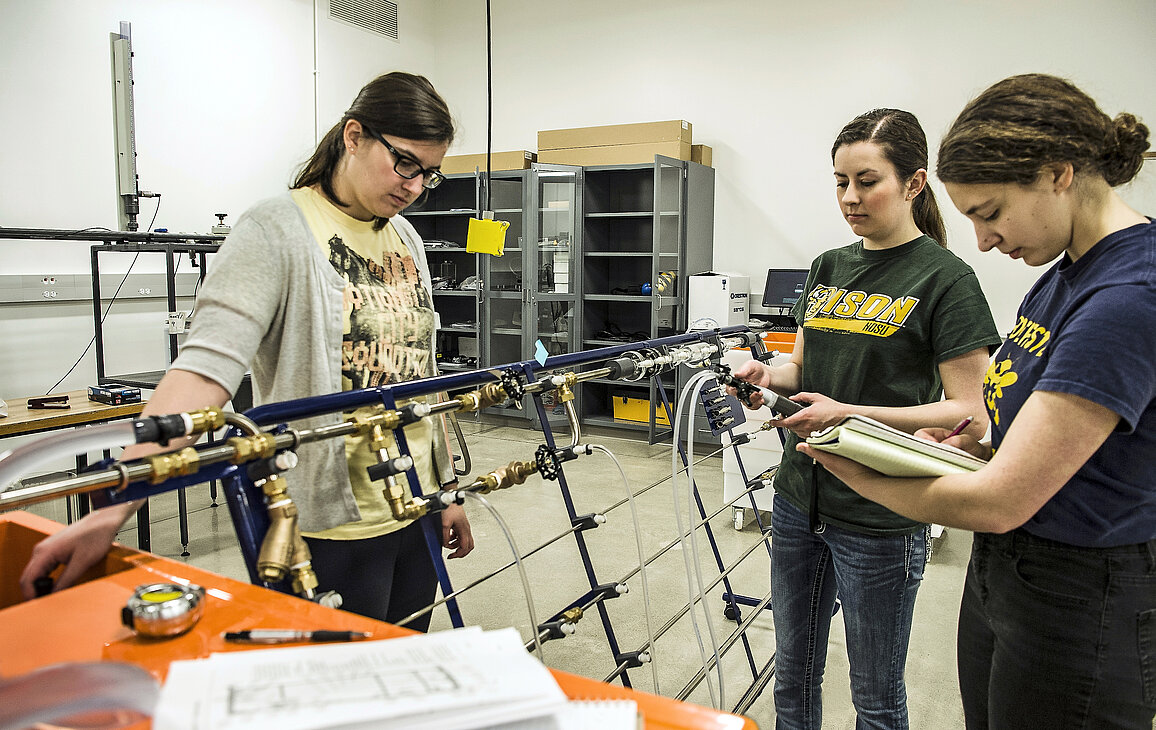The mechanical engineering program at NDSU traces its origins to 1892 when the Department of Mechanic Arts was created with the hiring of Professor Edward S. Keene, a graduate of the University of Illinois with a B.S. degree in Mechanical Engineering. The department graduated its first student with a B.S.M.E. degree in 1899. In 1903, the name of the department was changed to the Department of Mechanics and Physics, and in 1909, the mechanical engineering “division” was created within the Department of Engineering. In 1953, the department was relocated to Dolve Hall, in which it still resides. Since its inception in 1892, over 4,000 students have received B.S. degrees in Mechanical Engineering from NDSU.
Our curriculum is designed to produce baccalaureate-level graduates who are well prepared to accept engineering positions in industry and government, or to pursue advanced degree studies. Strong program emphasis is placed on engineering science, laboratory, and design. The use of modern computer tools and techniques in engineering practice also is incorporated throughout the curriculum. In addition, liberal arts education is included to prepare graduates for becoming concerned and productive members of society.

Vision
To provide nationally recognized excellence in engineering education, research, and service to our profession and society.
Mission
The Department of Mechanical Engineering at NDSU will contribute to the aspirations of a land-grant university in the three primary components of education, research, and service. In support of these endeavors, the mission of the department is to:
- Educate undergraduate and graduate students in the fundamentals of the discipline, prepare graduates to effectively function in society in the field of their choice, and provide the learning skills to adapt to evolving personal and professional goals.
- Develop and maintain high quality research programs in traditional and emerging areas that build on the diverse strengths of the faculty, foster interdisciplinary collaborations, and address national and global needs.
- Serve the needs of the profession, the state of North Dakota, and regional industries to promote and enhance economic development opportunities.
ABET Accreditation
The Bachelor of Science in Mechanical Engineering program is accredited by the Engineering Accreditation Commission of ABET, https://www.abet.org, under the General Criteria and the Mechanical and Similarly Named Engineering Programs Program Criteria. ABET accreditation is important, as it ensures that our program:
- Has received international recognition of its quality.
- Promotes “best practices” in education.
- Directly involves faculty and staff in self-assessment and continuous quality improvement processes.
- Is based on “learning outcomes” rather than “teaching inputs.”
- Can more easily determine the acceptability of transfer credits.
Through application of ABET’s quality standards, we seek to achieve a better-educated, geographically mobile, and diverse technical workforce well prepared to advance innovation and excel professionally in fields of critical importance to society. Earning a degree from an ABET accredited program:
- Verifies that your educational experience meets the global standard for technical education in our profession.
- Enhances your employment opportunities, as many companies require graduation from an accredited program.
- Supports your entry into a technical profession through licensure, registration, and certification.
- Establishes your eligibility for many federal student loans, grants, and scholarships.
- Provides greater opportunities to work globally.
Curriculum Flexibility
The standard curriculum allows students flexibility in choosing courses that reflect their interests within the broad areas of mechanical engineering. These include mechanics, materials and nanotechnology, biomedical engineering, alternative energy sources, fluid dynamics, robotics and more. ME students also have the opportunity to pursue minors in coatings and polymeric materials and biomedical engineering, among others, which can enhance their educational experience.
Faculty and Facilities
The Department of Mechanical Engineering is housed in Dolve Hall, which is part of an eight-building engineering complex. Laboratories and classrooms are well-suited and equipped for teaching and research. Students have access to PC computer clusters and facilities located in Dolve Hall to assist them in their laboratory and class work. The faculty offers a variety of expertise and extensive experience in teaching and research.
Career Opportunities
Recent graduates have found employment in companies throughout the United States. The average starting salary is approximately $61,000. A sampling of companies hiring NDSU graduates includes: 3M, American Crystal Sugars, Angus Palm, Applied Engineering, Arctic Cat Inc., Black and Veatch, Bobcat, Boeing, Cargill, Caterpillar, Daktronics, Horsch Anderson, Integrity Windows, John Deere, Montana Dakota Utilities, Parker-Hannifin, Puget Sound Naval Shipyard and Xcel Energy.


